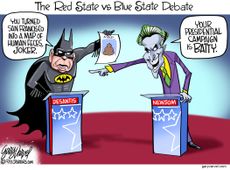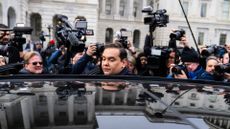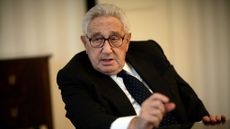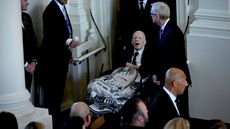Ten Things You Need to Know Today: 7 September 2023
The Week’s daily digest of the news agenda, published at 8am
- 1. Rates rises may be over
- 2. Terror suspect escapes prison
- 3. New legal blow for Trump
- 4. Russian missile attack kills 17
- 5. Modi wants ‘constructive’ action on climate
- 6. Care failings for autistic children
- 7. Palestinians hold talks with Saudis
- 8. Home gadgets are ‘spying’
- 9. Bulger mother learns death details
- 10. UK ‘drifts towards work-life balance’
1. Rates rises may be over
The Bank of England (BoE) may stop raising interest rates as soon as this month, its governor has hinted. Speaking to MPs, Andrew Bailey said that the period when it was “clear that rates needed to rise going forwards” was now over. The BoE’s Monetary Policy Committee is “delicately poised” on the matter as inflation falls, said the Financial Times. Several figures have indicated they will vote against another rise in two weeks.
2. Terror suspect escapes prison
The hunt is continuing for a terror suspect who escaped prison by clinging to the underside of a food delivery van. Daniel Abed Khalife, 21, was awaiting trial at Wandsworth prison in London after being accused of leaving fake bombs at a military base. Ports and airports have been placed on high alert for Khalife, who was previously labelled a flight risk. Prison authorities face serious questions about the “staggering lapse” of security, said The Times.
3. New legal blow for Trump
A judge has ruled that Donald Trump is liable for defamatory comments he made in 2019 about the writer E. Jean Carroll. Judge Lewis Kaplan declared that Carroll’s second civil defamation trial against the former president will be limited to determining damages. In the first trial in the case, Trump was found liable for defamation and sexual abuse, regarding Carroll’s allegation that he assaulted her in the changing rooms of a New York department store in the mid-1990s. He was fined $5m.
Subscribe to The Week
Escape your echo chamber. Get the facts behind the news, plus analysis from multiple perspectives.

Sign up for The Week's Free Newsletters
From our morning news briefing to a weekly Good News Newsletter, get the best of The Week delivered directly to your inbox.
From our morning news briefing to a weekly Good News Newsletter, get the best of The Week delivered directly to your inbox.
Donald Trump’s most serious legal challenges
4. Russian missile attack kills 17
At least 17 people have been killed in a Russian missile strike in eastern Ukraine. The missile hit a busy market in Kostyantynivka, a town in the Donetsk region. Dead bodies could be seen “amid flames that engulfed cars and shops in the built-up area” in a video posted by Ukraine President Volodymyr Zelenskyy, said The Times. Antony Blinken, the US secretary of state, is in Kyiv on a surprise visit to show support for its counteroffensive.
Is Ukraine counter-offensive showing signs of success?
5. Modi wants ‘constructive’ action on climate
Western countries should not impose “restrictive” climate change policies on the developing world, said the prime minister of India. Writing in The Times, Narendra Modi argued that tackling climate change should not be done at the expense of developing countries, and suggested that the West needs to be more “constructive”. Any action on the issue must be “complementary” to development rather than risk holding back economic progress, he added.
Extreme heat: how deadly will it be by 2030?
6. Care failings for autistic children
The BBC has said that dozens of young autistic people have died after “serious failings in their care” and despite repeated warnings from coroners. The broadcaster identified 51 cases where Prevention of Future Death notices issued by coroners described serious failings in the care of autistic people, and health and social care bodies were urged to take action to prevent future deaths. Former Justice Secretary Sir Robert Buckland described the findings as “deeply disturbing”. The government said £4.2m is being invested to improve services.
7. Palestinians hold talks with Saudis
The Palestinians are demanding a cash injection of hundreds of millions of dollars and more control of land in the occupied West Bank if there is a three-way deal involving the US, Saudi Arabia and Israel. Officials from the Palestinian Authority have held talks with Saudi Arabia and are also due to see US officials, to describe their response to moves for a “landmark pact to normalise Israel-Saudi ties”, said the BBC.
8. Home gadgets are ‘spying’
A consumer group has warned that smart home devices, including appliances like washing machines, demand unnecessarily large amounts of user data that could end up in the hands of social media and marketing firms. Which? said that smart speakers, doorbells, security cameras, TVs and washing machines are all “invading our privacy” by collecting more data than is needed for the device, The Times reported. Which? branded the gadgets as “spies in the home”.
9. Bulger mother learns death details
The mother of James Bulger said she is only now learning some details of her son’s murder in 1993. Denise Fergus only attended one day of the trial, as she was pregnant, and was concerned for the effect the stress would have on her unborn child. But now, through her involvement in a new documentary, she has discovered that a metal railway component was used to kill James, who was two. Earlier this week, she said she is facing a “very worrying time” after one of her son’s killers, Jon Venables, was granted a new parole hearing.
10. UK ‘drifts towards work-life balance’
People in the UK are among the least likely to say work should always come first, a new study has found. According to the World Values Survey, 73% of people in the UK say work is “very or rather important in their life” – the lowest of 24 countries. Some 96% of people in Italy and Spain agreed with the statement, 94% in France and 99% in the Philippines. Bobby Duffy, director of the policy institute at King’s College London, which analysed the results, said there is a “steady drift towards a greater focus on getting work-life balance right” in the UK.

Continue reading for free
We hope you're enjoying The Week's refreshingly open-minded journalism.
Subscribed to The Week? Register your account with the same email as your subscription.
Sign up to our 10 Things You Need to Know Today newsletter
A free daily digest of the biggest news stories of the day - and the best features from our website
-
 Today's political cartoons - December 2, 2023
Today's political cartoons - December 2, 2023Cartoons Saturday's cartoons - governors go Gotham, A.I. goes to the office party, and more
By The Week US Published
-
 10 things you need to know today: December 2, 2023
10 things you need to know today: December 2, 2023Daily Briefing Death toll climbs in Gaza as airstrikes intensify, George Santos expelled from the House of Representatives, and more
By Justin Klawans, The Week US Published
-
 5 hilarious cartoons about the George Santos expulsion vote
5 hilarious cartoons about the George Santos expulsion voteCartoons Artists take on Santa versus Santos, his X account, and more
By The Week US Published
-
 10 things you need to know today: December 2, 2023
10 things you need to know today: December 2, 2023Daily Briefing Death toll climbs in Gaza as airstrikes intensify, George Santos expelled from the House of Representatives, and more
By Justin Klawans, The Week US Published
-
 10 things you need to know today: December 1, 2023
10 things you need to know today: December 1, 2023Daily Briefing Fighting resumes as the Gaza truce ends, New York appeals court reinstates Trump gag order, and more
By Harold Maass, The Week US Published
-
 Ten Things You Need to Know Today: 2 December 2023
Ten Things You Need to Know Today: 2 December 2023The Week’s daily digest of the news agenda, published at 8am
By The Week UK Published
-
 10 things you need to know today: November 30, 2023
10 things you need to know today: November 30, 2023Daily Briefing Israel and Hamas extend their truce at least 1 more day, Henry Kissinger dies at 100, and more
By Harold Maass, The Week US Published
-
 10 things you need to know today: November 29, 2023
10 things you need to know today: November 29, 2023Daily Briefing Hamas release 12 more hostages, Jimmy Carter emerges from hospice care to attend Rosalynn Carter's memorial service, and more
By Harold Maass, The Week US Published
-
 10 things you need to know today: November 28, 2023
10 things you need to know today: November 28, 2023Daily Briefing Israel and Hamas extend their cease-fire, Trump urges appeals court to keep blocking gag order, and more
By Harold Maass, The Week US Published
-
 10 things you need to know today: November 27, 2023
10 things you need to know today: November 27, 2023Daily Briefing Israel and Hamas consider extending truce, 3 Palestinian students are shot in Vermont, and more
By Harold Maass, The Week US Published
-
 10 things you need to know today: November 26, 2023
10 things you need to know today: November 26, 2023Daily Briefing US citizen expected to be among third round of hostages released by Hamas, Israeli oil tanker reportedly seized off Yemen’s coast, and more
By Justin Klawans, The Week US Published









